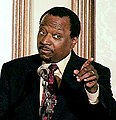Republican Party (United States) presidential primaries, 2000
|
|
|||||||||||||||||||||||||||||
|---|---|---|---|---|---|---|---|---|---|---|---|---|---|---|---|---|---|---|---|---|---|---|---|---|---|---|---|---|---|
|
|||||||||||||||||||||||||||||
|
|||||||||||||||||||||||||||||

Republican primary results. Red denotes a Bush win. Yellow denotes a McCain win.
|
|||||||||||||||||||||||||||||
|
|||||||||||||||||||||||||||||
The 2000 Republican presidential primaries were the selection process by which voters of the Republican Party chose its nominee for President of the United States in the 2000 U.S. presidential election. Texas Governor George W. Bush was selected as the nominee through a series of primary elections and caucuses culminating in the 2000 Republican National Convention held from July 31 to August 3, 2000, in Philadelphia, Pennsylvania.
The primary contest began with a fairly wide field, as the Republicans lacked an incumbent President or Vice President. Texas Governor George W. Bush, son of George H. W. Bush, the most recent Republican president, took an early lead with the support of much of the party establishment and a strong fund-raising effort. Former cabinet member George Shultz played an important early role in securing establishment Republican support for Bush. In April 1998, he invited Bush to discuss policy issues with experts including Michael Boskin, John Taylor, and Condoleezza Rice. The group, which was "looking for a candidate for 2000 with good political instincts, someone they could work with," was impressed, and Shultz encouraged him to enter the race. After stumbling in early primary debates, Bush easily won the Iowa caucuses.
...
Wikipedia



